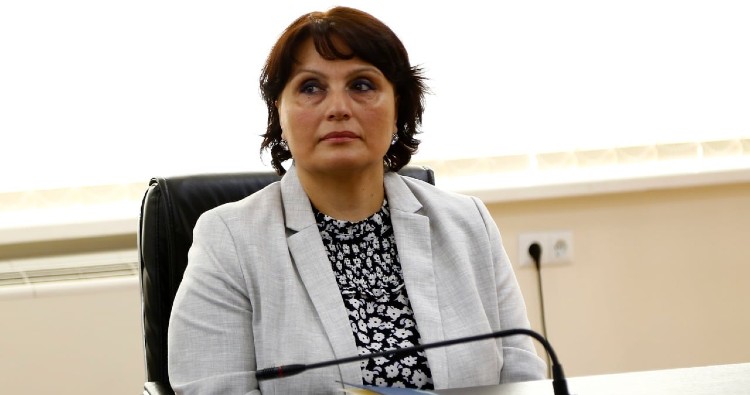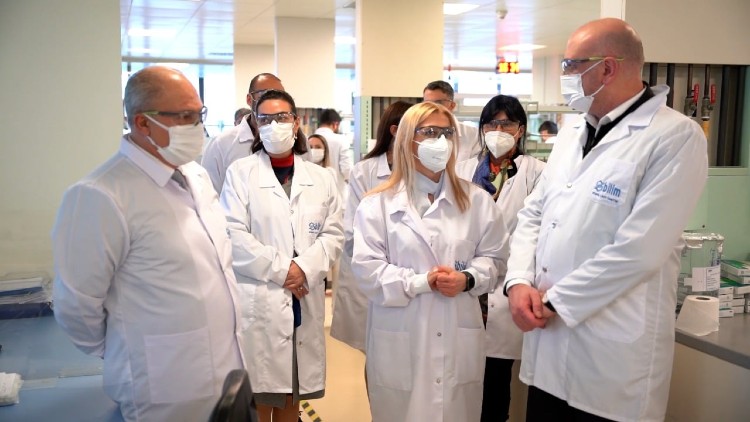Health Ministry Policy Department Head: Healthcare reform aims to bring “proper, quality medicines” to patients

"The patient now has the opportunity to make a choice, and to choose the desired medicine from the list of equivalent products offered, according to the manufacturer, price or other property," Adamia said. Photo: Health Ministry.

The Ministry of Health of Georgia has launched a large-scale reform aimed at making the Georgian pharmaceutical sector transparent and accessible, and offer high quality medicines to citizens. Changes include patient prescriptions - which, starting this week, can only be issued for drugs under generic or international titles, to enable patients to pick specific products from brands during purchase.
Eka Adamia, the Head of the Policy Department of the Health Ministry, spoke to agenda.ge about the reform, explaining the reform mainly aimed to ensure the “benefits of each component is felt first and foremost by patients”. Adamia said the process would help create a competitive environment in the pharmaceutical market, and ultimately reduce the cost of medicines.
The Georgian pharmaceutical market has been characterised by a lack of regulations as well as a less competitive environment, high price of products, polypharmacy, self-medication and misuse of medicines by patients, Adamia said in the interview to explain the necessity of the Ministry’s initiative. The reform also includes the recent launch of imports of medical drugs manufactured in Turkey following an initiative by the Georgian Prime Minister - with the aim of effecting a reduction of prices on the Georgian market - which the Ministry official said had shown a “very serious result” in the early stages through a reduction of prices by almost 60-80 percent for certain medications.
Under the new regulations, doctors will be prohibited to issue prescriptions for products under their trade name, while pharmacists will be required to offer customers equivalents of three high-quality and cheapest medicines from the prescribed generic type.
The patient now has the opportunity to make a choice, and to choose the desired medicine from the list of equivalent products offered, according to the manufacturer, price or other property," Adamia said.
 In order to ensure the high quality of medicines, a “positive list” of drugs has been developed to ensure patients will receive high quality, equivalent products from pharmacies. Adamia said the title of the “positive list” did not imply any restriction on sale of medicines that did not make the list. Photo: Health Ministry.
In order to ensure the high quality of medicines, a “positive list” of drugs has been developed to ensure patients will receive high quality, equivalent products from pharmacies. Adamia said the title of the “positive list” did not imply any restriction on sale of medicines that did not make the list. Photo: Health Ministry.
The Health Ministry official also explained a novelty in defining another group of pharmaceutical products. "This group includes medicines that should not be used without a doctor's prescription as their uncontrolled or untargeted use may harm the patient. These include antibiotics, anti-inflammatory and antihypertensive types," Adamia noted.
Also as part of the reform, starting April 1, pharmacists have been required to sell medicines only based on digital prescriptions, with the first group of psychotropic drugs added to the requirement starting April 11.
"This change will significantly regulate the misuse of non-therapeutic doses of psychotropic drugs, which poses a great threat to human health," Adamia said, adding the digital prescriptions would be able to monitor both over-the-counter pharmaceutical companies and prescription doctors.
"Our goal is to get the right, proper, quality medicine to the patient, because the main thing is their health. Naturally, the availability - or the price - of these medicines is no less important. Therefore, after the implementation of all components of the reform, it will ultimately have a positive impact on both the health of citizens and their financial situation," Adamia added.
We also asked the Ministry official about the challenges for doctors in adapting to the digital changes in their work. Adamia said the Ministry had started communicating with doctors over the changes early. "Trainings were held with clinics, family doctors, insurance companies, the pharmaceutical sector" to make sure they would be ready to work in the updated regulations “without any problems”, she told us.
The Head of the Policy Department also explained, “if a doctor does not have information about the generic drug of a specific use, they can use the name of a familiar brand to search for results in a single list, and then issue a prescription to the relevant generic product."
 Photo: Health Ministry.
Photo: Health Ministry.
Adamia said it was “important” that the Ministry had developed the reform and its action plan based on recommendations of the Competition Agency, and a study conducted by the World Health Organization. The Ministry consulted with both Georgian and international experts,and studied the experience of other countries before approving the changes, she said.
"We cooperated with the WHO expert Luka Vončina [in the process]. One of the recommendations was to introduce a mandatory national e-prescription system, which would connect all prescribing physicians and all pharmacies, as well as provide the cheapest generic equivalent instead of branded medicine. We have adapted the experience of the countries and the challenges we have," the health official noted.
Asked if there is now a risk that the practice of polypharmacy would be transferred from a family doctor to a pharmacy, the Ministry representative said the risk was insured by the digital prescription system. The unified list used in it displays the type of medicines, as well as the purpose for its prescription, with the risk of lobbying for specific products by both doctors and pharmacies also insured. "If we see a consumer constantly buying the same medicine, regardless of the drugs offered, this may point to a case of lobbying for a particular medicine by the pharmacy," Adamia told us.
As part of the reform, the full cycle of the pharmaceutical sector operation is planned to be digitised in an effort to contribute to market transparency. The Ministry of Health believes the reform will have a “really serious scale” that will ultimately lead to a “very significant result” in terms of ensuring highest possible access to high-quality pharmaceutical products, the official said.
Among comments on the reform from healthcare professionals, therapist Ketevan Tsertsvadze shared her opinion about the decision made by the Ministry over generic drugs.
 Photo: Commersant.ge
Photo: Commersant.ge
Expanding the generic segment is important to increase access to medicines. Competitive prices will regulate prices for medicines and increase the availability of quality medicines. The relationship between the doctor, the pharmacist and the patient will be regulated," Tsertsvadze said.
Eka Burdzenidze, the Director of Aversi Pharmacy network, noted patients would be able to choose the desired products from the manufacturer and price options and based on generic prescriptions, adding "from our side, the process is technically [already] fully operational.
We also spoke to Nana Motsonelidze, a resident of Tbilisi who suffers from chronic illness and has to frequently use medication. Aged 64, she is retired and believes the Health Ministry's reform to have been “necessary” for her and other people who spend a large part of their finances on medicines. She said she would “definitely” use the opportunity to buy generic products.It's very good that [now] I can choose medicines according to my budget. I often have to take medication to regulate my blood pressure, I have chronic thromboembolism and constantly need to buy medications that cost quite a lot. Now I can choose which one to buy, and as far as I know, this price does not affect the quality," she said.
 Tweet
Tweet  Share
Share